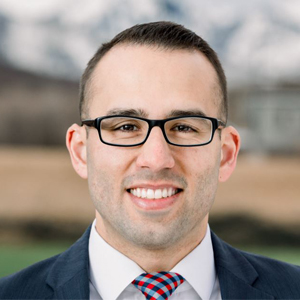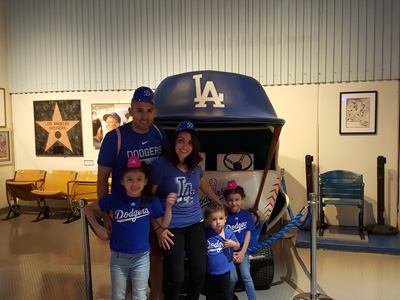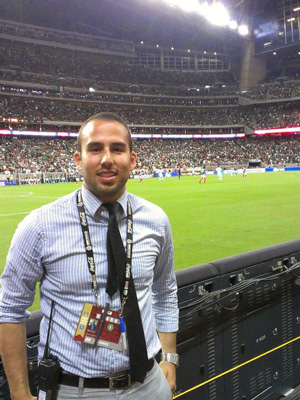30 Questions with SMBA Alumnus Walter Franco
SDSU Sports MBA recently spoke with Walter Franco (SMBA ‘14), Senior Manager at Victus Advisors, to learn more about the details of his role with the sports  business consulting company, his approach to networking, and learn more about his
Sports MBA journey, including his favorite course and his graduate assistantship with
Soccer United Marketing working activations at the men’s Mexican National Team matches
around the U.S. in 2013.
business consulting company, his approach to networking, and learn more about his
Sports MBA journey, including his favorite course and his graduate assistantship with
Soccer United Marketing working activations at the men’s Mexican National Team matches
around the U.S. in 2013.
1. Walter, let’s start with the basics…Where did you grow up?
I was born in San Diego but lived in Tijuana until I was three or four and then in San Diego until I was nine. And then from there, I jumped to Nevada and Utah, but ultimately went to the last part of junior high and high school in Utah and have been living here for the last 20 years (a few years in California, Florida, and Georgia).
2. Who are Victus Advisors and what does your company do?
Victus Advisors is an independent marketing, financial, and economic feasibility consulting firm that specializes in objective research and data-driven recommendations for sports properties and sports/event facility development.
3. Victus is based in Park City, Utah, but you’ve worked on projects nationwide and have worked extensively internationally as well. What are some recent projects you’ve worked on?
We've worked on projects ranging from small communities and cities, all the way up to professional teams and university projects. We are currently working on projects in Delaware, Virginia, Utah, California, and Hawaii!
4. Walk us through a typical workday in your role at Victus.
As cliche as it may sound, no day is alike. One day we might be on the phone all day speaking with event organizers or stakeholders. Oftentimes we (Zac Ipson (SMBA ‘18), and our boss, Brian Connolly) will all be working on different projects so we’ll check-in at the beginning of the week to make sure we’re all on the same page because we will contribute different parts to the same study. I enjoy working with a fellow SDSU Sports MBA alum, but Zac is a BYU alum and I’m a University of Utah grad and there’s a huge rivalry there, so Zac and I keep it VERY civil in the office to keep both of us sane!
5. What skills do you utilize most in your role? And what advice would you give to someone interested in working in the sports consulting space?
A little bit of everything. This is an example of tasks that we would complete in a typical study:
- Demographic/Socioeconomic Analysis - so understanding how to process and present secondary market research data
- Stakeholder and Event Organizer Analysis - this is where we get primary market research data. We speak directly with key stakeholders and potential users of new facilities.
- Competitive Market and Facility Analysis - researching other markets and facilities that would compete with a potential market/facility.
- Economic Impact Analysis - how many jobs would be created, incremental hotel nights, etc. would be generated by a new facility in a market.
- Funding Analysis - understanding various financial funding sources (via government, private, etc.) to pay for a facility project.
- In summary, as consultants, we’re hired to answer these questions for clients and provide relevant recommendations.
 6. Did you have sports business experience before you applied to SDSU Sports MBA or
did you use the program to launch your career in sports?
6. Did you have sports business experience before you applied to SDSU Sports MBA or
did you use the program to launch your career in sports?
I did an internship with Real Salt Lake, a few years before grad school, just to kind of start getting my feet wet in sports and also with the athletic department at the University of Utah and for a guy who was running basketball camps and clinics here in Salt Lake Valley.
7. How do you see COVID-19 permanently changing the sports industry?
From the current situation with the pandemic, it is unclear how much more the industry is going to change. There will be increased demand for certain types of roles or skill sets. At this point, who knows, because thousands of people have been laid off from professional sports teams and agencies because of the current pandemic. So I'm definitely interested to see once things hopefully normalize, whether that's in a year or two years, to see what the new outlook will be on the sports industry.
8. What are some sports business podcasts you like to listen to on a regular basis?
Hang Up and Listen is my go-to. Also the Bloomberg Business of Sports Podcast.
9. What teams do you support?
- NFL: Raiders
- NBA: Lakers
- MLB: Dodgers
- Soccer: Obviously, the Mexican National Team, Club Tijuana, and PSG
9. We’re seeing a lot of Los Angeles teams for a young boy from San Diego/Tijuana and Nevada/Utah.
To me it makes sense! My first love is the Lakers, you could actually watch the games on KCAL from San Diego and that’s how I was hooked when I was about 6. I got the Dodgers from my dad, and I instantly fell in love with the Raiders from watching the old NFL films on VHS when I was a kid. They all happened to be in LA at the time! From the university side, at a young age, I only knew about Notre Dame because of my favorite player, Tim Brown.
10. What was your favorite course (or faculty member) in SMBA?
I would definitely say Sports Marketing with Dr. Dalakas. I really enjoyed talking about marketing and sports marketing activation in that space and definitely interact with him a lot on Twitter (@DrSportBusiness) as well so it’s been a lot of fun keeping in touch with him.
11. Favorite experience in SMBA?
The Soccer United Marketing/Major League Soccer graduate assistantship that I did working on partnership activation for the Mexican National Team friendly matches throughout the US. It definitely opened my eyes to what International Soccer is like and it was really cool to be behind the scenes with the preparations for the match. And so now whenever I watch a friendly match on TV it just makes me think of all the work that goes on leading up to the game from a marketing and business standpoint, and also the just the impact that it has on the Mexican American community in the US.
11. Where did you travel for FMF matches during the year you were here? Who were some of the stars of that 2013 national team?
I traveled to San Francisco, Houston, and New York. The last friendly we worked on happened to be in San Diego, so I didn’t have to travel for that one. I didn’t get to meet with any players, but Chicharito, Ochoa, and Rafa Márquez played in most of those friendlies.
12. What are some of the best or most popular activations you’ve seen at Futbol Fiesta sponsor area adjacent to the stadium before FMF matches?
AT&T, Allstate, Coca-Cola, and Home Depot had the most popular activations, but mostly because they gave out a lot of swag and raffled suite tickets for the match.
13. What was your favorite outside of the class project you worked on?
If you can count the trip to the Dominican Republic, I would say that. That was definitely a great experience to visit the Dominican Republic to see the impact that baseball has in the Dominican Republic and also see the challenges that Major League Baseball faces there. We asked questions like do they have a corporate social responsibility towards players that they're recruiting and what happens to those that ultimately don't get professional contracts? What happens with those that do get a professional contract but end up using all of their signing bonus right away on family and friends? I think there's a lot of real-life consequences from MLB’s investment there. And I've always been curious to really investigate where that line is for a corporation like MLB and the responsibilities to not leave a negative impact, especially for players that don't end up getting professional contracts.
14. Are there any sports business colleagues and former classmates whom you’d like to name-drop from SMBA ‘14?
(In alphabetical order) Adam, Carlos, Dom, and Steve, with a special tip of the hat to Rich Davis. He seems to just have a generally suave personality that is hard to replicate in real life. So, I have always had a nice little admiration for him. He's a cool customer and a nice guy.
15. You’re a big believer in networking, what are some of your favorite techniques to meet like-minded people in the industry?
I’ll take a page out of Mike Kitts’ (SMBA ‘07) book. He always emphasized, “Look to see how you can be of value to someone else before you ask them for something.” And so whenever I connect with people in the industry, I'm always seeing how I can help them in any capacity, not necessarily helping them by offering my service but helping them, whether it's making other connections or being some type of service to them that can build that relationship. And then from there, that's where other opportunities can arise.
16. What about outside of the sports industry?
I strongly recommend trying to get to know people outside of the sports industry and develop relationships with them as well. At any moment they may end up working in sports and they could be your boss or a potential client.
17. You’ve been out of the program since 2014, how has the industry changed since
your time on campus? 
From the academic side, there’s an influx of post-graduate sports programs offering you sports MBAs, sports management certificates, or different types of degrees of that nature. And so the competitive landscape has changed, where a lot of people recognize that to work in sports, you need to have some type of master's degree.
18. Your bi-cultural heritage and connections have helped you make extensive inroads into the sports business industry in Mexico. What are some projects you’ve worked on with sports business colleagues in Mexico?
At the moment all have been Mexican soccer-related so I have led a feasibility study for a new stadium, have helped broker licensing deals, and I've also brokered friendly matches.
19. What goes into the process of brokering a friendly match? What are some matches you’ve arranged?
I’ve brokered seven friendly matches for MLS and USL clubs to play against clubs from Mexico, Guatemala, and Argentina. The brokering process is not as complicated as one might think. I’ve developed strong relationships with front-office execs so MLS/USL clubs will ask me for help in finding a club for a potential friendly match. Since I have established relationships with the potential clubs, I act as the middleman and ensure both parties come to a mutually beneficial agreement with regards to appearance fees, expenses, etc. And I help to ensure both parties keep their end of the agreement.
20. Your comments appear often discussing the growth of Liga MX in the United States, both in English and Spanish. What do you see for the future of Liga MX in the next 5-10 years?
The Liga MX and it's clubs benefit greatly from being able to count on 35 to 40 million Mexican Americans living in the US and so it's low hanging fruit. And that's why they have such high TV ratings, but in the next, five to 10 years as the demographics keep shifting and as second and third-generation immigrants speak less Spanish in the home and less Spanish outside of the home and become more Americanized and have consumer habits similar to mainstream American citizens/Caucasian American citizens, you're going to see things change. Liga MX clubs just haven't done a great job at all at adapting their marketing message to that demographic. And what's going to happen is these fans aren’t going to resonate with the clubs of their parents or their grandparents, and they're going to start going for LAFC or Atlanta United. You’re starting to see it already. They're going to go for clubs that they can identify with that, that speak their language, that share similar cultural traits. And so LigaMX collectively and individually as clubs have really been slow to react and a lot of them just treat Mexican Americans in the US, their core demographic or their core target fan base, the same as they treat their fans in Guadalajara or Mexico City, which is a huge error and so they need to do a better job of understanding the markets in the US and beyond not only capture low hanging fruit but also to grow abroad. If that doesn't happen, I really think in the next 10 to 15 years Liga MX will just become a domestic league with zero relevance outside of the outside of Mexico.
21. Best go-to spot in Salt Lake/Park City for a business breakfast meeting?
Definitely I would say The Park Cafe or Over the Counter. The Park Cafe has a more popular vibe right now in the community, especially amongst millennials. It's definitely a hotspot for a lot of professional athletes from soccer and basketball that go there often. Over the Counter was, I think, actually, the first restaurant of it's kind over by where I went to high school. In fact, I think The Park Cafe has an employee or co-owner of the previous restaurant, so that's the history there.
22. You have three young daughters, what kind of sports are they into at the moment?
Their life right now is gymnastics so they haven't really taken any interest in my professional teams yet, but I’m trying to get them involved in other sports like golf, tennis, and soccer. It’s not sticking yet, but we'll try again down the road and give it another shot with them. But it's interesting that none of them have taken on my personality when I was a kid, where all I did was live, breathe and consume televised sports and their lives are practicing gymnastics, which is a sport, of course, just not one you watch often on TV. They’re also into all the things that any typical little girls would want to do.
23. What are the best tortillas you’ve ever had?
Depends on the kind!
Corn tortillas: Anywhere in Tijuana, you can’t go wrong. Usually, just the grocery store tortillas are good enough or the actual tortilla factories. I don’t have a specific name because you can get a good tortilla almost anywhere in Tijuana.
Flour tortillas: There’s a tortilleria in Rosarito called Tortilleria Autlan that’s really, really good. Also, just the ones at the grocery store in Calimax in the whole state of Baja California, those are really good. And also and a tortilla factory in Mexicali called La Sabrosita, that’s really good as well.
24. 3 favorite GIFs you like to use:
- Denzel Washington relieved
- Antonio Banderas chuckling
- Jake Gyllenhaal point and laugh (from the movie Nightcrawler)
25. “Hahaha” or “jajajaja”?
Ambos! (Both!) I use both depending on what language I’m speaking with my friends on WhatsApp.
26. The next three questions come to us via your former classmate Steve Fuller (SMBA ‘14): If you could assume ownership of any professional sports team, which team, why, and what are the first changes you would make?
This question could get me in trouble, so I’ll just say any soccer club in Mexico. The first change I would make would be to understand the club’s place in the Mexico and U.S. market and apply the best commercial practices from North American leagues to maximize revenues.
27. If you were a WWE superstar, what would be your name and calling card?
La Roca - “Puedes oler lo que la Roca está cocinando?”
28. Should the University of Utah football team need additional talent next year, how many years of NCAA eligibility do you have remaining?
All four years!
29. What advice do you have for current students or those looking to break into the sports industry?
Be realistic with expectations coming out of school. A lot of folks that want to get in the industry have the dream of working in a front office at the GM level, etc, or a six-figure salary. You can get there, but unless you’re Theo Epstein, it will take time. Most end up working entry-level roles (even after a Masters) and burn out after a year or two of selling tickets or corporate sponsorships. Create a 5 and 10-year plan and set measurable goals for your career in the industry. Having a “respect the process” mentality will go a long way.
30. How can students or prospective students find you online?
- Twitter: @thewfranco
- LinkedIn: linkedin.com/in/francowalter/

